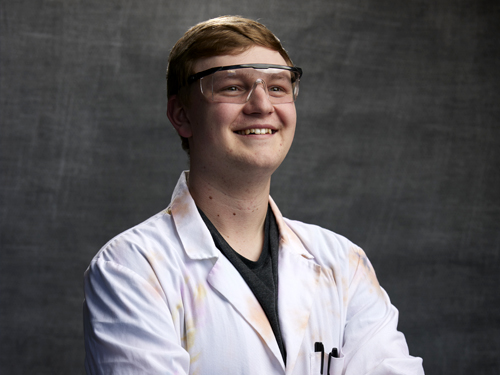Salmonella bacteria infections could drop if Braden Lewis can help it. The biochemistry major has been making significant progress toward solving the problem since his first year at Iowa State.
If you’ve ever suffered from food poisoning, you’re not alone. Salmonella bacteria alone cause 1.35 million infections and 420 deaths in the U.S. every year. Those numbers could plummet soon, though, if biochemistry major Braden Lewis can help it. He’s been researching — and making significant progress toward solving — the problem since his first year at Iowa State.
There’s safety in numbers
Braden will tell you that killing dangerous microbes during food production is not easy. Most traditional methods — from canning and pasteurization to antimicrobials — also affect food quality by also killing vitamins or contributing to microbe resistance. A newer approach, cold plasma, preserves food quality without fueling resistance, but has its own downside.
“Cold plasma alone creates a good kill, but it takes a long time. I asked, is this approach really a relevant, feasible solution? The answer is yes if a microscopic amount of cinnamaldehyde —which is extracted from cinnamon oil — is added during the process.”
The time needed to complete the process, which takes a sustained burst of 70,000 volts of electricity, was cut nearly in half during Braden’s experiments.
“We achieved an almost 100 percent kill,” he says. “Producers will value this.”

—Braden Lewis
From nerd to scientist
Braden, a self-described “science nerd” who grew up playing with microscopes and chemistry kits, felt at home as soon as he arrived on Iowa State’s campus.
“Other schools don’t use students in the lab until their junior or senior year, but I started researching right away. It’s become a passion for me. And now I’m authoring a paper on my research topic.”
Working in Dr. Aubrey Mendonca’s food science lab has nurtured other interests for Braden, as well. Now a senior, he wants to teach and mentor others, goals he’ll keep in mind as he applies to graduate schools.
“I’m committed to using science to benefit the world,” he says. “‘How can I fix something?’ is a question I am always asking. Research is a natural response.”



